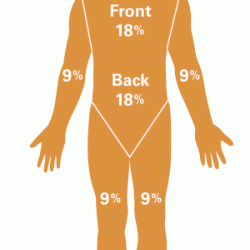Source Institutions
Source Institutions
Add to list Go to activity
Activity link broken? See if it's at the internet archive

In this activity, learners compare and contrast their own skin (including the area covered) with that of an orange. This activity helps learners understand that skin is a vital part of the body and must be protected from sun damage. This lesson guide includes background information, resources, variation ideas and a bilingual (English and Spanish) handout.
- 5 to 10 minutes
- 1 to 2 hours
- $1 - $5 per group of students
- Ages 8 - 14
- Activity, Experiment/Lab Activity, Lesson/Lesson Plan
- English, Spanish
Quick Guide
Materials List (per group of students)
- 2-3 feet of wax paper
- Crayons or colored markers
- Metric tape measure
- Orange or tangerine
- Paper towels
- Plastic knife
- Roll of tape
- Sheet of centimeter ruled graph paper
- Sheet of paper or a notebook for observations
- Copy of "Skin Observations" sheet
Subjects
-
Earth and Space Science
-
Earth Structure
- Atmosphere
-
Solar System
- The Sun
-
Earth Structure
-
Life Sciences
-
Human Body
- Muscles and Skin
- Health and Nutrition
-
Human Body
-
Mathematics
-
Data Analysis and Probability
- Data Analysis
- Data Collection
-
Measurement
- Units of Measurement
- Size and Scale
- Circles
-
Number and Operations
- Exponents
-
Data Analysis and Probability
-
The Nature of Science
-
The Scientific Process
- Conducting Investigations
- Gathering Data
- Formulating Explanations
- Communicating Results
-
The Scientific Process
Informal Categories
- Food and Cooking
- Nature and Environment
Audience
To use this activity, learners need to:
- see
- read
- touch
Learning styles supported:
- Involves teamwork and communication skills
- Involves hands-on or lab activities
Other
Foreign language versions of this resource:
Components that are part of this resource:
This resource is part of:
Access Rights:
- Free access
By:
- Moreno, Nancy P. ; Tharp, Barbara Z. ; Dresden, Judith
Rights:
- All rights reserved, Baylor College of Medicine, 2011
Funding Sources:
- National Institute of Environmental Health Sciences (NIEHS) of the National Institutes of Health (NIH), R25 ES06932
- National Institute of Environmental Health Sciences (NIEHS) of the National Institutes of Health (NIH), R25 ES010698
